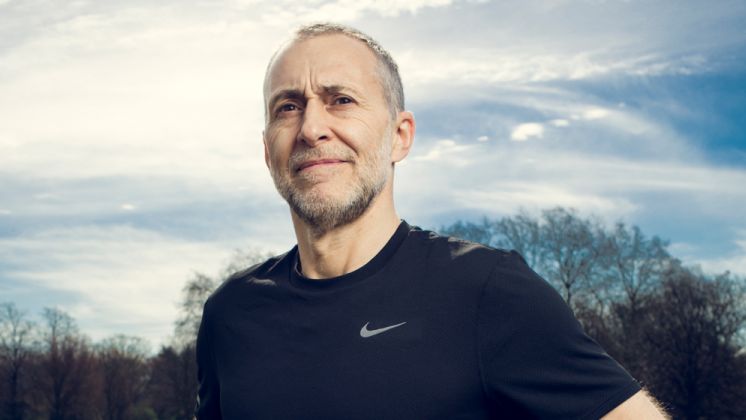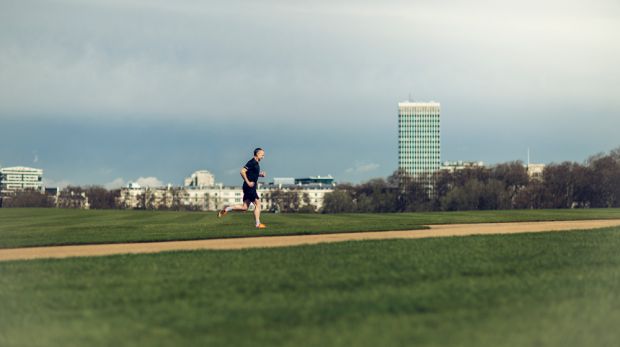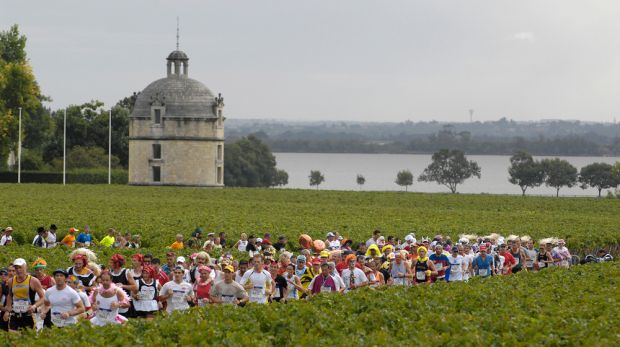Running with Michel Roux Jr – The Speedy Chef
His first love is cooking, but running comes a close second – as well as his two Michelin stars, he’s notched up 21 marathon finishes

He’s been at Le Gavroche, his Mayfair restaurant, for three hours doing staff interviews and filming a link for Britain’s Got More Talent, and it’s only 9am. Yet Michel Roux Jr is wide-eyed, energetic and ready to head out for a run in Hyde Park – something he does whenever he can…
We’ve heard you should never trust a skinny chef…
That’s crap. It harks back to another era. My retort to that? Never trust a fat chef.
Why not?
They must spend too much time sat in their office eating and drinking their profits.
With their fingers literally in all the pies?
Exactly, and imbibing too much of the establishment’s booze! I say that tongue in cheek, but it really is important for chefs to be physically fit to perform at their best.
Around the peak of Anthony Bourdain’s fame, chefs had a kind of rock star status and were renowned for heavy drinking. Isn’t that the case now?
No – and even if you look at rock stars like the Rolling Stones they’re all teetotal now too. We still have some hell-raisers in the industry, but the higher you get in the restaurant world the more focused you have to be and that kind of behaviour just isn’t conducive to success. Having said that, there is still an element of alcohol and substance abuse.
Why do you think that is?
It comes from the stress of the job, the long hours, and constantly striving for perfection. Plus, you’re in a business where alcohol is all around you so the temptation is there.
How do you resist that temptation?
I totally avoid alcohol when I’m working. It’s far easier to say no than it is to say yes to one and then stop one leading to two, leading to three, leading to a bottle.
Get the Coach Newsletter
Sign up for workout ideas, training advice, reviews of the latest gear and more.
RECOMMENDED: Staying Sober When Socialising is Part of Your Job
Does running fulfil that stress-relieving role for you?
Years ago – before I took up running as a way of life – I suffered from intense migraines, I smoked a lot and used to drink a fair bit. I just was not a nice person at times. I could quickly lose my temper. Then I gave up smoking and started running as a motivational thing to keep off the cigarettes and lose the weight I had put on as a result of giving up.
Why running over other exercise?
Like many people, I was inspired by watching the London Marathon. I decided I wanted to do it and in pursuing that goal running soon became an addiction. My migraines disappeared, I lost weight and I started thinking more clearly. That’s a benefit of exercise in general but running has the bonus of allowing you to be out on your own for an hour or so. It’s a tremendous release.
RECOMMENDED: The Best Men’s Running Gear
So you use running like meditation?
Absolutely. It’s a wonderful feeling, especially for someone like me who is so busy. There’s rarely a minute in the day without someone asking me a question, a phone ringing or some kind of responsibility. Having time to myself through running is vital for my sanity.

How do you fit it in?
Anyone can do it with a bit of time management and prioritising.
Don’t you have to love what you’re doing to prioritise it?
I suppose so, and I’m lucky I’ve always adored running. But I still would never have come back to it if the London Marathon didn’t motivate me to. Don’t love running? Find a motivation to do it. Got a friend who runs that you can tag along with? Soon your natural competitive side will kick in and they’ll inspire you to improve. There are many ways to self-motivate.
What do you say to people who think running is boring?
How can it be boring? It’s the most wonderful freedom! You don’t have to run fast, just go at your own pace. There’s no need for expensive kit, you just need shoes, shorts, a T-shirt and off you go. You don’t need a monthly membership, plus you can easily bring your gear on holiday with you, and you’ve got the freedom to explore wherever you are by foot while getting a free workout. What’s boring about that?
Nothing, we totally agree. The risk of injury can also put people off – have you ever had problems?
Yes, wear and tear can be a problem. I’ve had an operation to clear up some cartilage, I broke a leg skiing eight years ago, and my knees are now getting to the point where they can be very painful.
RECOMMENDED: Common Running Injuries and What to Do About Them
But you’ve still managed to do 21 marathons and one ultra. Were any of those painful?
Distance running is more about mental strength than anything. The ultra was 100km. In a marathon your mind starts playing games with you around the 30km mark, but with an ultra you’ve just got more time to go crazy. When I hit the marathon distance I was feeling good and then suddenly a little thought said, “Shit, that means there’s another marathon and a half to go”.
RECOMMENDED: Great Running Challenges
How do you get over that?
It became like a cartoon where the two sides of a conscience are battling. One half of me was full of negativity, screaming to stop, while the other was saying, “You’ve got this far, just carry on”. In situations like that you just need to ignore the negatives thoughts no matter how loud they get. Around the 80km mark I had to stop running and walk for a bit, but I never gave up and by the time I got to the end I sprinted over the uphill finish line, and felt absolutely incredible.
RECOMMENDED: Vassos Alexander: “No Good Ever Came from Giving up”
How were the knees after that?
They were sore but I’d discovered the damage limitation power of Pilates and yoga by then.
RECOMMENDED: Pilates Stretches for Runners
Is that the secret to staying relatively injury-free?
I think so. My wife does yoga, and at first I had the typical bloke reticence to try it but it’s so effective. The core strengthening moves and stretches really do benefit runners, especially as you get older.
Most people neck energy gels when they do endurance races. Have you got any gourmet energy snack alternatives?
Ha! Sadly, I haven’t developed my own gourmet version but I do find gels hard to digest so I avoid them unless I’m running for longer than two hours. Proper food is always preferable, but the problem is carrying it during races. When I did the ultra in France they had little cakes, biscuits, dried fruit, and grilled meats at the stations. That’s what you want.
Any wine?
No, you’re thinking of the Marathon du Médoc. I’ve done it twice. You run through 48 different chateaus in the Médoc region and practically every one lays on a spread of pate, oysters, cheeses, steaks and yes, red wine.

RECOMMENDED: The World’s Best Marathons (That Aren’t in the UK)
Did you partake?
I did it once without having any wine. Still, it’s not a fast course because there’s a lot of gravel, a lot of hills…
A lot of drunks?
Yeah, you’ve got to dodge them too. Even without partaking it took me around 4hr 10min, so the next time I went at a more leisurely pace and may have had a couple of glasses on the way.
At which point it becomes more of a speed-walking tour of the region?
You could say that.
Roux’s Running Dos (and Don’ts)
Running tips from the long-distance chef
It’s not a race
The bad experiences people have when running mostly stem from going too fast. Don’t compare yourself with others. Go at a comfortable pace and you’ll find you aren’t just trying to get the whole ordeal over with.
Choose a time (and stick to it)
Having a regular running slot makes it easier to form a habit. Run to work if you can. You’ll feel energised when you arrive and can use the time on the way back to de-stress after a hard day.
Skip sugary drinks
Sugar is the enemy and we need to be wary of it. It’s quickly stored as fat and, unless you’re running for more than an hour, necking an energy drink will sabotage any weight loss effect from the run.
Michel Roux Jr owns and runs Le Gavroche in London. Make a reservation at le-gavroche.co.uk
Max was the head of digital content for Men's Fitness which worked alongside Coach between 2015 and 2019.

